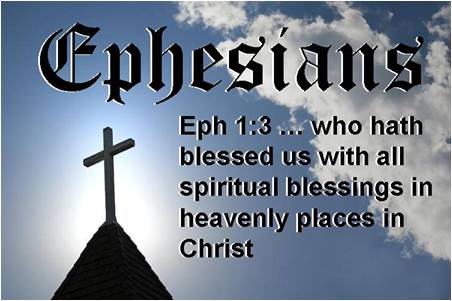 Ephesians is a “Prison Epistle,” along with Philippians, Colossians, and Philemon (see Eph 3:1, Eph 4:1, and Eph 6:20). Written by Paul from Rome, the epistle expands on themes in Colossians, much as Romans does to Galatians. Whereas Colossians develops the all-sufficiency of Christ to the Church, Ephesians shows the blessings of that “fullness” enjoyed by the members of God’s family. The idea of unity resulting from reconciliation runs strong through the book (Eph 1:9-10; Eph 2:16-18; Eph 3:4-6; Eph 4:3-6; Eph 5:30-32; Eph 6:18-20). It is possible that the epistle was actually a circular letter to the churches of Asia. Paul’s goal is to inform the saints of their privileged status and exhort them to live in a way worthy of their standing.
Ephesians is a “Prison Epistle,” along with Philippians, Colossians, and Philemon (see Eph 3:1, Eph 4:1, and Eph 6:20). Written by Paul from Rome, the epistle expands on themes in Colossians, much as Romans does to Galatians. Whereas Colossians develops the all-sufficiency of Christ to the Church, Ephesians shows the blessings of that “fullness” enjoyed by the members of God’s family. The idea of unity resulting from reconciliation runs strong through the book (Eph 1:9-10; Eph 2:16-18; Eph 3:4-6; Eph 4:3-6; Eph 5:30-32; Eph 6:18-20). It is possible that the epistle was actually a circular letter to the churches of Asia. Paul’s goal is to inform the saints of their privileged status and exhort them to live in a way worthy of their standing.
Gene Cunningham - June 10, 2003
Galatians 7

Spiritual life originates in the Holy Spirit (Gal 2:20), but operates in the sphere of liberty (Gal 5:1), and results in sacrificial service (Gal 6:1). The focus and motive in "you who are spiritual" is Christ (Gal 6:1-2). Spirituality is defined in Chapter 5 as being led by the Spirit (Gal 5:6, Gal 5:11-24). "Meekness" is power under control not weakness (Gal 6:1) — submission to the authority of Word of God and power of the Spirit and considering the glory of Jesus Christ. Make sure you don't have an attitude of condescension (Gal 6:3). "Law of Christ" (Gal 6:2) is the only law we're under — "faith working through love" (Gal 5:6), "law of liberty" (Jam 1:25, Jam 2:12), "royal law" (Jam 2:8), "the love of Christ compels us" (2Co 5:14). Love is burden bearing (Gal 6:2, Rom 15:1). God welds us together through ministry to one another (Rom 8:28). This a matter of realism (Gal 6:3) and personal responsibility.
Spiritual living is oriented toward the eternal harvest (Gal 6:6-10). At the judgment seat we stand alone; our actions then will be something in which we can rejoice (Gal 6:4). Spiritual living focuses on eternity. Paul felt the debt Jesus paid (Rom 1:14, Rom 8:12-13, Mat 16:24). Confession of sin without correction is self-deceiving (Gal 6:7-8). "In fellowship" is not a Biblical concept. "Having fellowship one with another" (1Jo 1:7) means joint participation —action, engagement, involvement striving toward a joint goal. Paul suggests we view every decision and action from eternity. Our eternal harvest is what we've sown (Gal 6:8-10). Our "cross" to bear is the sacrificial service to others as an ambassador and priest (Gal 6:10, Gal 5:6). We can fall into the trap of making a good appearance, yet rob our service of the power of the Spirit of God (Gal 6:12). Paul returns to his boast in the cross (Gal 1:4, Gal 6:14). "Walk" means to advance in step that is in the power of the Spirit and love of Christ (Gal 6:14-17).
As the disciples were eating the passover, memorializing 1500 years before, Jesus gave them the communion elements (Mat 26:26). Jesus gave His body and blood as a gift. He is the only mediator — the God-man.
Scripture References: Galatians 6:1-2, Galatians 6:7-8, Galatians 5:6, Galatians 1:4, Romans 8:28, Galatians 6:1, Matthew 16:24, Galatians 6:2, Galatians 6:12, Romans 15:1, Galatians 5:1, Romans 8:12-13, Galatians 6:3, Galatians 5:6, Galatians 6:2, Galatians 2:20, Romans 1:14, Galatians 6:1, Galatians 6:10, James 2:8, Matthew 26:26, Galatians 6:4, Galatians 5:11-24, Galatians 6:8-10, James 2:12, Galatians 6:14-17, Galatians 6:6-10, Galatians 5:6, John 1:7, James 1:25, Galatians 6:14, Galatians 6:3
From Series: "Galatians - The Truth and Power of the Gospel - Hot Spring AR - 2009"
This series was given at Grace Bible Church of Hot Springs Arkansas in November 2009.

